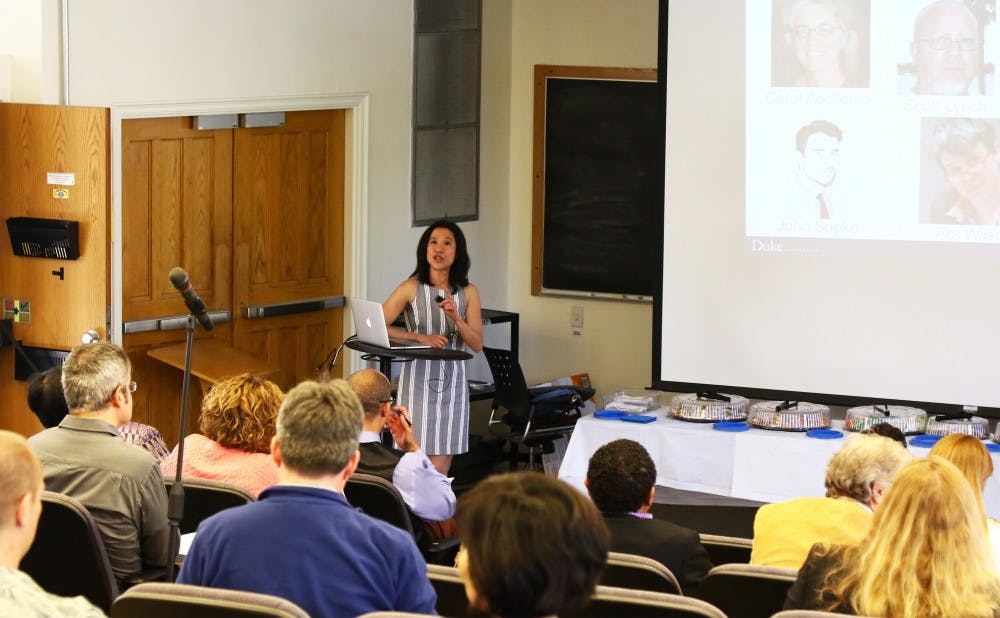Valerie Ashby, dean of the Trinity College of Arts and Sciences, discussed the administration's efforts to promote diversity within Trinity at Thursday's Arts and Sciences Council meeting.
Ashby presented updates on activities centered around three strategic themes—excellence, leadership and diversity. As the council is considering curriculum reform, Ashby stressed the importance of institutionalizing efforts to integrate diversity into both the curriculum and conversations on campus.
“Three people sitting on a stage talking to a thousand is not a conversation,” Ashby said, referencing last November's public forum in Page Auditorium, in which administrators listened to student demands about inclusion and diversity. “It was meaningful and it was necessary, but that’s not what we’re talking about. We’re talking about the ongoing conversations that we should consistently be having around this topic with faculty, staff and students.”
She noted that in order to foster these ongoing conversations about diversity on campus, two groups were recently formed—the Trinity University Advisory Committee, which is comprised of faculty and staff, and a 17-member committee made up of students. The Advisory Committee has decided to focus on education, conversation and communication.
Ashby added that she and Larry Moneta, vice president for student affairs, have had six to eight meetings with the concerned student groups who read demands at the second forum in Page Auditorium, including black students, Asian students and Latino/a students.
She also pointed to other recent actions taken by the administration to support diversity within Trinity, including two new hires of black faculty in the social sciences. Twenty faculty members in 10 departments took place in a Teaching for Racial Justice workshop, which discussed how to establish a classroom environment of “inquiry without fear," Ashby said.
She noted, however, that many Duke community members are not aware of these initiatives, and explained that it is the responsibility of Trinity to inform faculty, staff and students about the efforts and conversations taking place.
“Some of the things I’m telling you here you don’t know, so that means there’s poor communication,” she said.
In other business:
Lee Baker’s term as dean of academic affairs will end June 30. Upon completion of his term, he will remain a professor at the University. Baker noted in an email that he will remain a professor of cultural anthropology.
One faculty member, referencing “what’s been going on in the last month,” asked for clarification about which staff members the diversity initiatives Ashby mentioned would apply to.
“I am horribly concerned about every staff member on this campus,” Ashby said. “My part in that as Trinity dean is to express that concern and to weigh on making sure that those staff are appreciated and compensated in ways that are fair.”
The faculty member also asked about the status of the International Comparative Studies program.
“There’s no [current] funding for [certain programs] to ever be a department,” Ashby said. “So the question is how do you make that a stable entity. My hope is that we can have this resolved sooner rather than later.”
Suzanne Shanahan, associate research professor of sociology and chair of the Imagining Duke Curriculum Committee, provided updates on the committee's discussions of curriculum reform and reviewed some of the feedback that faculty have given. Ideas discussed included changing departmental major requirements, designing the new Duke Experience course and changing the number of credits required to graduate.
She suggested that departments may need to consider creating different major requirements as an option for students who have different goals, such as prospective Ph.D. students. As for the Duke Experience course, she noted some conflicting feedback from the faculty.
Although some were “disconcerted with a unifying theme,” others felt that one class was not enough to create a “Duke experience," Shanahan said. She also noted that increasing the number of required credits from the current 34 may allow for more freedom in designing the new curriculum.
“We will actually come back early fall with a proposal,” Shanahan said. “That’s the optimistic view. I think it depends on how much energy we can rally over the summer, but that’s the vision.”
She added that what the proposal will look like is still largely to be determined.
Amrith Ramkumar contributed reporting.
Get The Chronicle straight to your inbox
Signup for our weekly newsletter. Cancel at any time.

